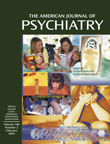Gene Therapy for Psychiatric Disorders
Abstract
There has been tremendous progress in developing techniques for manipulating genetic material, and the birth of gene therapy as a discipline has been one consequence of this. Most considerations of gene therapy in the nervous system have focused on attempts to transfer novel genes in for the purpose of protecting neurons from neurological insults. In this review, the author considers the progress in that field and the possible application of related gene therapy approaches to the far more difficult task of buffering against a psychiatric disorder. As an emphasis, the author reviews how the biology of psychiatric disorders is so often one of vulnerability to particular environments. Because of this context dependency, it would be likely that many possible gene therapeutic interventions would need to be context dependent as well. Thus, the author considers the plausibility of developing gene vector therapies that use conditional expression systems, in particular ones whose expression would be induced by the same environmental perturbations that exacerbate psychiatric symptoms themselves. In particular, the author considers the role of stress as a predisposing factor in certain psychiatric disorders and the ways in which stress signals can be harnessed as inducers of conditional expression systems in gene therapy.



